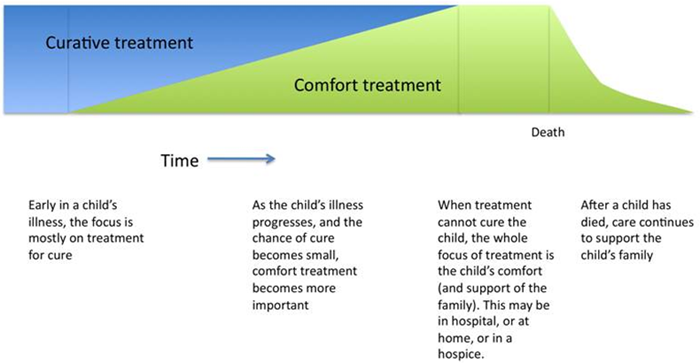"Comfort treatment" or "palliative care" focus on making sure that a child or adult is comfortable and not in pain.
There are different types of medical treatment.
Some treatment is curative. It aims to cure a sickness, to make the patient get better. For example, antibiotics are a type of curative treatment to get rid of bacteria
Some treatment is supportive - it helps support body organs, but isn't able to cure an illness. Life support treatment is a type of supportive treatment.
Some treatments are for symptoms or comfort. They help someone feel better, but don't cure them or help their organs to work. Pain-medicines like morphine or paracetamol are a type of comfort treatment.
There are different comfort treatments. Some are medicines, like paracetamol or morphine. Other medicines stop someone from feeling sick or vomiting. Other comfort medicines ease muscle tension or spasms, or help the patient to sleep. Comfort treatment also includes other things that are not medicines. For example, it might include massage or music therapy, or talking and support from a carer.
Comfort treatment is often provided as part of a medical speciality called Palliative Care. Doctors and nurses who work in palliative care are experts in looking after symptoms and providing positive experiences for children and adults who have illnesses that can't be cured and that may lead them to their death. Situations like this have a big impact on those around the child. Palliative care specialists have a lot of experience in talking about decisions with parents and in looking after the whole family as well as the child. Palliative care includes care for all of the child's different needs, including physical, psychological, emotional and spiritual needs. They may be able work out the best place of care (for example families may like to take their child home). They can often also help with talking to other people, for example the child's siblings. See also What do I tell my other children?
|
"we tried to fill his life with as many positive, good experiences that we possibly could, in small versions that he could take in"
|
No, comfort treatment is important for all children who are sick. Palliative care experts are able to help many children who are not dying, but who have serious illnesses or who are sick for a long time.
Yes. In fact it is possible for children to have curative treatment, supportive treatment and comfort treatment all at the same time. However, when treatment can't cure, and life support treatment isn't working, comfort treatment becomes the most important thing to provide.
When children have a serious illness it may not be clear at first whether they are going to be able to recover. Treatment is started aiming for a cure and supporting their vital organs until they get better. Comfort treatment is important, but our first priority is often to get the child better.
If it appears that the child may not survive, palliative care specialists will sometimes become involved to help support the child and their family. At this stage, life support treatment and curative treatment may continue because they still have some chance of helping. If the child gets better, palliative care teams may no longer be needed. Other times, when life support treatment needs to stop because it isn't helping, the whole focus of treatment becomes comfort care.
